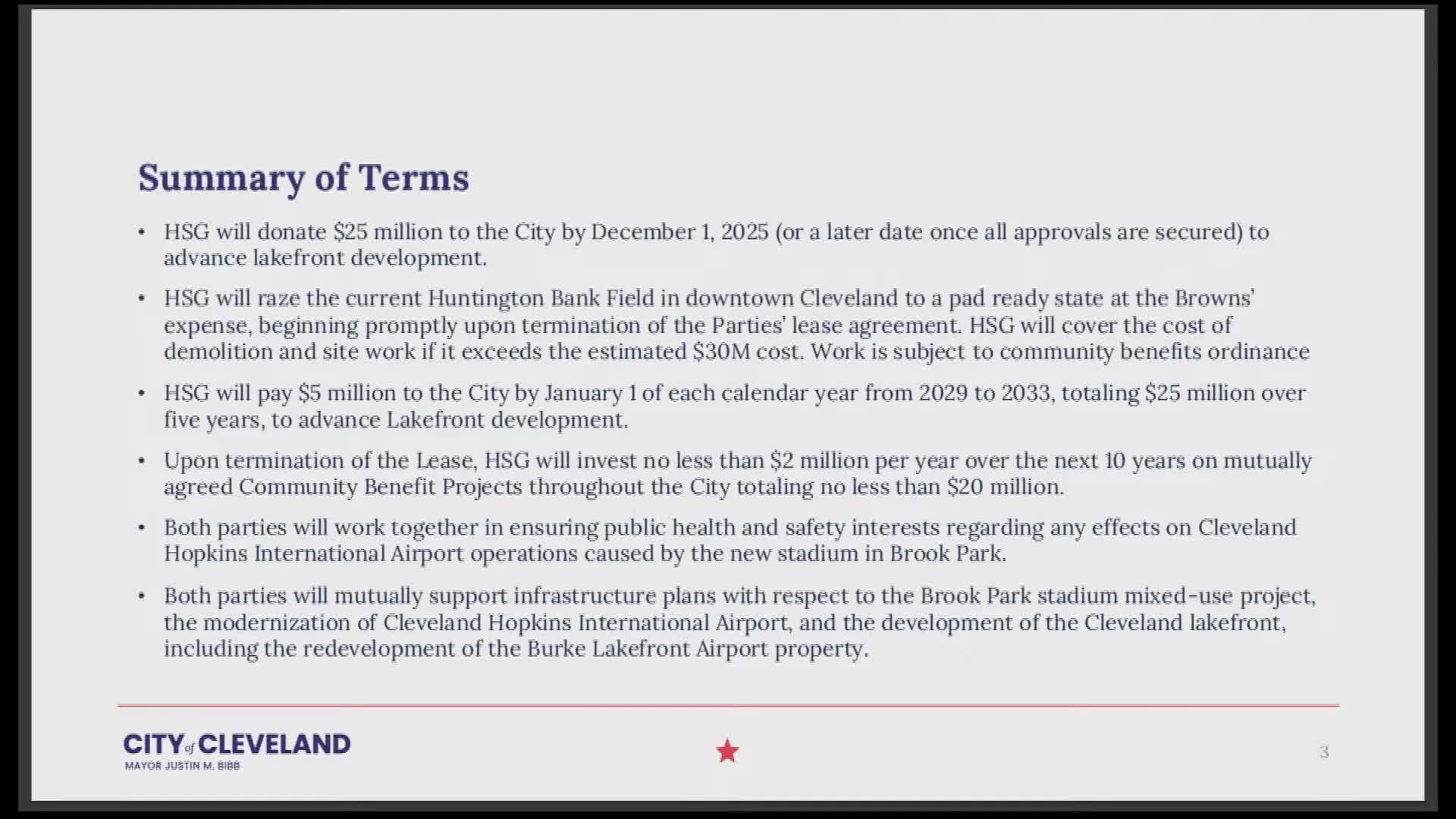Administration outlines $100 million settlement package as Cleveland council committee presses for oversight and detail
Get AI-powered insights, summaries, and transcripts
Subscribe
Summary
City administration presented a proposed $100 million settlement with Haslam Sports Group that would include a $25 million upfront donation, demolition and pad‑preparation of Cleveland Browns Stadium at owner expense, and $20 million in community benefits over 10 years; council members demanded clearer pad‑ready definitions, oversight for community dollars and protections around dismissing litigation.
CLEVELAND — City officials on Thursday outlined a proposed settlement with Haslam Sports Group that would finance lakefront work, cover stadium demolition costs and provide multi‑year community payments, while council members pressed for precise timelines, oversight and legal safeguards.
Bradford Davey, chief of staff to Mayor Justin Bibb, told the Transportation & Mobility Committee the package is structured as multiple buckets of value: “HSG will donate 25,000,000 to the city of Cleveland by 12/01/2025, to advance lakefront development,” and HSG will “cover the cost of demolition and site work even if it exceeds the $30,000,000 estimated cost.” Davey added that the deal includes $25,000,000 paid over 2029–2033 and a $2,000,000 per year community benefit payment for 10 years, totaling $20,000,000.
The administration said the settlement reflects a difficult legal reality: no court can compel the Browns to remain in the stadium past the end of the lease in February 2029, and the package is intended to secure tangible restitution for the city rather than run protracted litigation. “This settlement is a result of that reality,” Davey said.
Still, council members raised repeated questions about how the money would be used and who would decide. Several members asked for a clear, written definition of what “pad‑ready” will mean for the lakefront site once the stadium is removed; Scott Skinner of the North Coast Waterfront Development Corporation said engineers are examining subsurface issues and that the city is working to consolidate submerged land leases to make future development financeable.
On oversight, council members asked whether Haslam Sports Group would have veto power over community proposals. Jessica Trevisano, a senior adviser in the mayor’s office, said the process would be collaborative: council and the administration would jointly propose projects each March and submit them to HSG for discussion. “It would be a discussion much like this one, that would be out in the public,” she said.
Members also pressed the administration about the legal settlement process. Several legislators questioned why the city would dismiss pending lawsuits with prejudice within 48 hours of final signatures rather than staying litigation until the Brook Park project had shovel‑ready financing. Mark Griffin, the city’s law director, said dismissal with prejudice and the timing were required to start the settlement payments and preserve certain negotiated outcomes; he acknowledged that Browns would argue the city could be limited from refiling, and said the law department is preserving reasonable future claims where feasible.
Financial details were a recurring concern. Trevisano said remaining debt service tied to the stadium is roughly $9.2 million a year for 2026–2028 (about $30 million in principal) and estimated annual health‑and‑safety capital repairs at roughly $4 million per year. Committee members asked whether the $25 million upfront could instead be used to reduce the outstanding bond burden; administration officials said the dollars are intended to advance lakefront development and mitigation, though technically funds could be applied differently if parties agreed.
Council members also sought documentation and independent analysis: Speaker 13 noted an Osborne Engineering 2024 study estimating about $117 million in investment would be required to keep the stadium at current standards through 2034 and asked that the report be circulated to committee members.
Several council members voiced broader skepticism rooted in past public subsidies for sports facilities and the long‑term cost to neighborhoods. “We cannot continue to make bad decisions around this city,” one member said, listing prior investments and urging independent valuations. Former mayor and U.S. representative Dennis Kucinich, during public comment, urged council to slow the process, seek appraisals and avoid rushing to accept an upfront payment he said could amount to giving away substantial public assets.
Administration officials repeatedly emphasized two points: that HSG accepts responsibility for demolition and pad preparation even if costs exceed the estimate, and that all future public improvements would remain subject to city planning review. “Although HSG will take responsibility for the site work, it will remain the purview of the city of Cleveland to approve any of those decisions,” Davey said.
Next steps outlined by staff include finishing the full settlement agreement language (including a precise pad‑ready definition) and returning to council with the finalized document before any final vote. Committee members proposed creating a community benefits oversight mechanism to track the annual $2,000,000 payments and ensure equitable contracting and hiring. The administration said those details will be fleshed out in the final agreement and that council will be included in forming the project list to present each March.
No formal vote was taken during the hearing; the committee convened to gather information and press the administration for further clarifications before legislation is scheduled for a future council vote.
